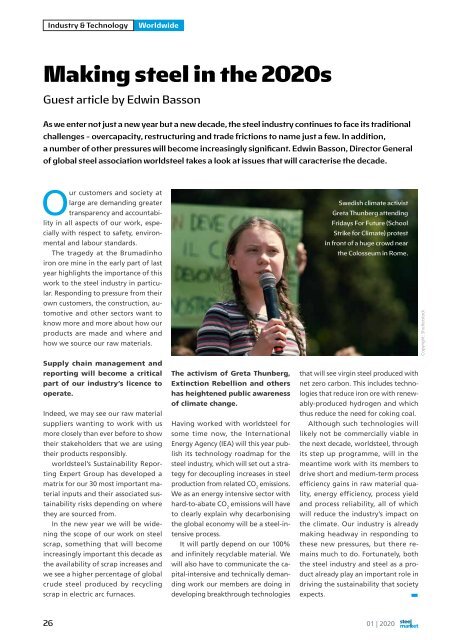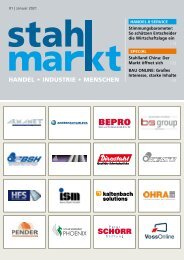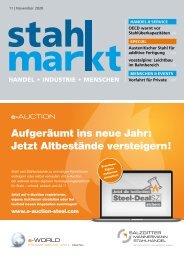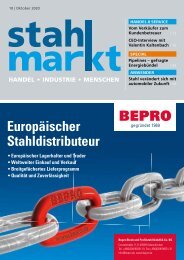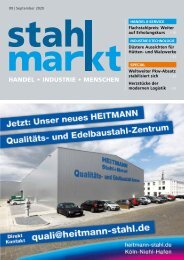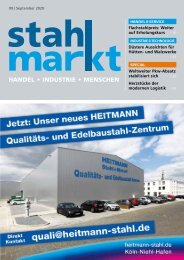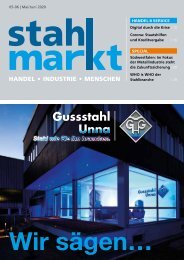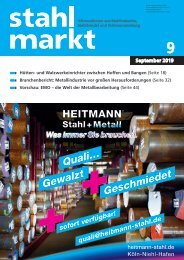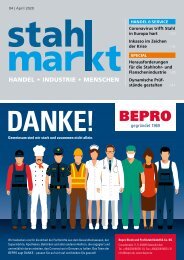Steel Market 01 / 2020
You also want an ePaper? Increase the reach of your titles
YUMPU automatically turns print PDFs into web optimized ePapers that Google loves.
Industry & Technology<br />
Worldwide<br />
Making steel in the <strong>2020</strong>s<br />
Guest article by Edwin Basson<br />
As we enter not just a new year but a new decade, the steel industry continues to face its traditional<br />
challenges - overcapacity, restructuring and trade frictions to name just a few. In addition,<br />
a number of other pressures will become increasingly significant. Edwin Basson, Director General<br />
of global steel association worldsteel takes a look at issues that will caracterise the decade.<br />
Our customers and society at<br />
large are demanding greater<br />
transparency and accountability<br />
in all aspects of our work, especially<br />
with respect to safety, environmental<br />
and labour standards.<br />
The tragedy at the Brumadinho<br />
iron ore mine in the early part of last<br />
year highlights the importance of this<br />
work to the steel industry in particular.<br />
Responding to pressure from their<br />
own customers, the construction, automotive<br />
and other sectors want to<br />
know more and more about how our<br />
products are made and where and<br />
how we source our raw materials.<br />
Swedish climate activist<br />
Greta Thunberg attending<br />
Fridays For Future (School<br />
Strike for Climate) protest<br />
in front of a huge crowd near<br />
the Colosseum in Rome.<br />
Copyright: Shutterstock<br />
Supply chain management and<br />
reporting will become a critical<br />
part of our industry’s licence to<br />
operate.<br />
Indeed, we may see our raw material<br />
suppliers wanting to work with us<br />
more closely than ever before to show<br />
their stakeholders that we are using<br />
their products responsibly.<br />
worldsteel’s Sustainability Reporting<br />
Expert Group has developed a<br />
matrix for our 30 most important material<br />
inputs and their associated sustainability<br />
risks depending on where<br />
they are sourced from.<br />
In the new year we will be widening<br />
the scope of our work on steel<br />
scrap, something that will become<br />
increasingly important this decade as<br />
the availability of scrap increases and<br />
we see a higher percentage of global<br />
crude steel produced by recycling<br />
scrap in electric arc furnaces.<br />
The activism of Greta Thunberg,<br />
Extinction Rebellion and others<br />
has heightened public awareness<br />
of climate change.<br />
Having worked with worldsteel for<br />
some time now, the International<br />
Energy Agency (IEA) will this year publish<br />
its technology roadmap for the<br />
steel industry, which will set out a strategy<br />
for decoupling increases in steel<br />
production from related CO 2<br />
emissions.<br />
We as an energy intensive sector with<br />
hard-to-abate CO 2<br />
emissions will have<br />
to clearly explain why decarbonising<br />
the global economy will be a steel-intensive<br />
process.<br />
It will partly depend on our 100%<br />
and infinitely recyclable material. We<br />
will also have to communicate the capital-intensive<br />
and technically demanding<br />
work our members are doing in<br />
developing breakthrough technologies<br />
that will see virgin steel produced with<br />
net zero carbon. This includes technologies<br />
that reduce iron ore with renew-<br />
ably-produced hydrogen and which<br />
thus reduce the need for coking coal.<br />
Although such technologies will<br />
likely not be commercially viable in<br />
the next decade, worldsteel, through<br />
its step up programme, will in the<br />
meantime work with its members to<br />
drive short and medium-term process<br />
efficiency gains in raw material quality,<br />
energy efficiency, process yield<br />
and process reliability, all of which<br />
will reduce the industry’s impact on<br />
the climate. Our industry is already<br />
making headway in responding to<br />
these new pressures, but there remains<br />
much to do. Fortunately, both<br />
the steel industry and steel as a product<br />
already play an important role in<br />
driving the sustainability that society<br />
expects.<br />
•<br />
26 <strong>01</strong> | <strong>2020</strong>


